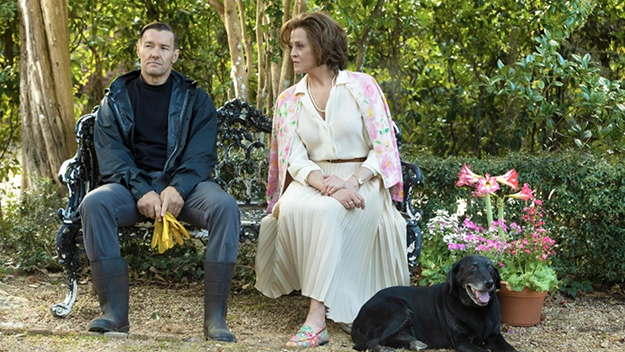Reap What You Sow
This article appeared in the May 11, 2023 edition of The Film Comment Letter, our free weekly newsletter featuring original film criticism and writing. Sign up for the Letter here.

Master Gardener (Paul Schrader, 2022)
With 2017’s First Reformed, 2021’s The Card Counter, and now Master Gardener, Paul Schrader has completed a trilogy of films that make explicit a hallmark of his filmography: the possibility of redemption, especially for isolated, existentially tortured men weighed down by histories of violence. First Reformed’s Ernst Toller (Ethan Hawke) is a former military chaplain who became a pastor following the death of his son in the Iraq War. William Tell (Oscar Isaac), the aptly named protagonist of The Card Counter, is a dishonorably discharged soldier-torturer, who refashions himself into a talented poker player. Violence inevitably circles these men’s lives, with their efforts to redeem themselves often leading them back to where they started. All his casino exploits notwithstanding, Tell ends up in the same prison where he spent nearly a decade for his crimes at Abu Ghraib. For Toller, whose encounter with radical environmentalists provokes a crisis of faith, the cycle is more metaphysical, tied up in self-destructive barbed wires of doubt, cynicism, and anger at the climate catastrophe devouring the world. If this trilogy has been, per Schrader, about despair and acceptance on the part of men who have partaken in America’s gravest sins, it is fitting that the final entry turns, at least superficially, to race.
Set in Gracewood Gardens, part of the palatial estate of the imposing Mrs. Haverhill (Sigourney Weaver), Master Gardener revolves around the quiet, thoroughly manicured head horticulturist, Narvel Roth (Joel Edgerton). As in First Reformed, we first encounter our antihero sitting at a desk lit by a single lamp, writing in a notebook as a voiceover narrates his inner monologue. At first he expounds mostly on the nature of plants, before turning to more autobiographical musings, making oblique references to guilt and renewal. It is eventually revealed that Narvel is a former white supremacist—his tattoos are carefully concealed beneath his earthy gardener’s uniform—and his newfound occupation is a WITSEC cover from his old crew of racists, whom he snitched on to the FBI.
One day, Mrs. Haverhill’s biracial grandniece, Maya (Quintessa Swindell), arrives at Gracewood; her mother has died, and Mrs. Haverhill has taken her in in the hopes of rehabilitating her from a life of drugs, financial insecurity, and familial isolation. Initially (but reluctantly) deflecting the romantic advances of Maya, who’s young enough to be his daughter, while indulging the carnal summons of Mrs. Haverhill, old enough to be his mother, Narvel finds himself caught within a love triangle that threatens to bring back his hidden past—or perhaps to free him from it, once and for all.
Schrader leans into the queasiness of these relationships and the topical evil of his protagonist’s former associations, though Master Gardener, characterized by the director in an interview with IndieWire as “a real gumbo of no-nos,” is less about racism than it is, as with Schrader’s last two films, about freedom. The abiding sentiment of the trilogy—and the films are ultimately sentimental—suggests that redemption is possible for even the lowliest of characters, whether they feel they deserve it or not. For First Reformed’s would-be ecoterrorist minister and The Card Counter’s tortured soldier, this makes for a compelling—if not necessarily inspiring—conclusion, if only because Schrader so thoroughly forces his audience into the insular, claustrophobic perspectives of his protagonists, the same way he did in his screenplay for Taxi Driver.
In Master Gardener, Narvel’s internal struggle opens out into the world through his relationship with Maya. The question the film poses is not merely if Narvel can redeem himself, but whether his love for Maya can change him for the better. Schrader skirts that question, relishing the taboo of an ex–white supremacist courting a young Black woman without taking that premise beyond mere provocation (and a little bit of wish-fulfillment). One could replace Narvel’s white nationalism with any contemporary hot-button issue without changing the narrative very much, because the filmmaker’s interest is less in the politics of racial justice than in the spiritual possibilities of redemption. Schrader does refrain from trite forgiveness narratives or lurid exploitation, instead allowing a subdued, often dreamlike atmosphere to filter into the film, making Master Gardener the trilogy’s most relaxed, even sweetest entry. But these atmospherics sand down intriguing thematic elements of class and moral responsibility that were more fully articulated and dramatized in the first two films. With Master Gardener, the director shrouds Narvel and Maya’s story in the sublime trappings of a fable, with more vibes than substance.
Nicholas Russell is a writer and critic from Las Vegas.







